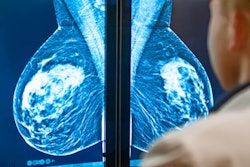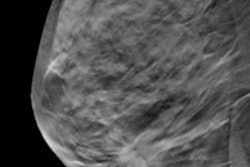
Microwave breast imaging may have the potential to be a noninvasive, nonionizing, and painless addition to the breast cancer diagnosis toolbox, according to research published 4 August in Academic Radiology.
In a "first-in-human" study, a team led by Brian Moloney, PhD, from Galway University Hospital in Ireland found that a microwave breast imaging system detected and localized the majority of breast lesions in 24 women.
Microwave breast imaging is an emerging technology that researchers have touted as a nonionizing, noncompressive approach to breast cancer diagnosis. However, current prototypes have been limited in localizing lesions.
For their study, Moloney's group used the Wavelia system developed by French firm MVG Industries; the device uses a low-power electromagnetic wave. Women were divided into three groups: those with biopsy-proven breast cancers, those with unaspirated cysts, and those with biopsy-proven benign breast lesions.
The system detected and localized 12 of 13 benign breast lesions, and nine out of the 11 breast cancers, including one case of a radiographically occult invasive lobular cancer. No device-related adverse events were recorded. Twenty-three of the women reported that they would recommend microwave breast imaging to other women.
While more studies need to be done with larger patient cohorts, the Wavelia system holds "significant" potential for detecting breast abnormalities while offering patients a favorable experience over conventional mammography, the authors concluded.



















